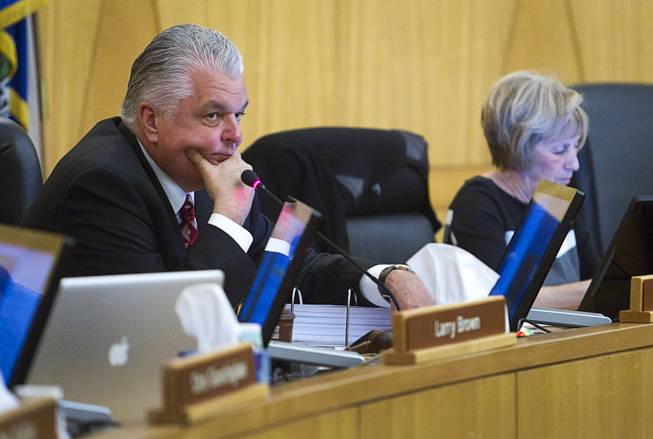
Clark County Commissioner Steve Sisolak listens to speakers during a commission meeting at the Clark County Government Center Tuesday, April 21, 2015. Commissioners called for a blue ribbon panel to investigate the professional guardianship system. ..
Wednesday, Aug. 17, 2016 | 2 a.m.
It’s wish-list season in Nevada politics.
With the biennial legislative session just months away, local politicians and governmental entities are busy deciding what their priorities will be come January. The Clark County Commission on Tuesday identified four bill draft proposals to submit to the Legislative Counsel Bureau.
Per state law, the county can submit up to four bill draft requests for the legislative session. The commissioners settled on pursuing legislation related to the following issues: Metro Police funding, the handling of presentence investigation reports, how the county can use indigent assistance funding and land annexations.
Here’s a look at the four bill proposals chosen:
Metro Police funding
It’s the conversation that won’t go away. For years, Clark County and the city of Las Vegas have been dueling over how to fairly fund the region’s largest police department, which patrols the Strip and downtown.
The discussion has turned heated in recent months as the two entities have lobbed accusations against each other, thrusting governmental tensions into the spotlight. Meanwhile, Sheriff Joe Lombardo has made an appeal to the Southern Nevada Tourism Infrastructure Committee for more money to bolster security in the tourist corridor.
Commissioner Steve Sisolak renewed the conversation Tuesday when he suggested examining the funding formula for the police department. As it stands now, the county contributes roughly 63 percent of Metro funding, with the city covering the remaining 37 percent.
The commissioners’ argue that while the county contribution has increased, the department has deployed more officers to areas within city limits, which they said raises this question: Is the county subsidizing the city’s lower crime rate at the expense of residents in unincorporated areas and the Strip?
“It’s really questionable whether it’s still fair,” Sisolak said.
The commissioners decided it was premature to seek a specific formula change, considering they haven’t had conversations with the sheriff and city peers. Instead, the commission approved a bill draft request that would authorize a study of the funding formula, which would look at its history and reasons for past changes.
Commissioner Marilyn Kirkpatrick said the study would essentially serve as a placeholder — leaving open the possibility of tweaks down the line. Pre-filed bills are never perfect, said Kirkpatrick, the former speaker of the Nevada Assembly.
“Why should we be perfect?” she said. “Let’s have an opportunity to mix it up a little.”
Efforts to reach the sheriff and city officials for comment were unsuccessful. The Las Vegas City Council is scheduled to discuss its bill draft proposals Wednesday during its meeting.
Presentence investigation reports
Before a judge can hand down a sentence to someone convicted of a felony or gross misdemeanor, there’s an extra step that must occur: A document outlining sentencing recommendations needs to be produced.
It’s called a presentence investigation report. Right now, its production is the responsibility of the Nevada Division of Parole and Probation.
But county officials said delays in judges receiving those reports have extended inmates’ stays at the Clark County Detention Center, driving up costs.
Clark County Manager Don Burnette suggested the county would be better off financially if it produced its own presentence investigation reports. (A state law passed in 2011 requires counties to pay 70 percent of the total cost of the reports.)
The commission agreed to submit a bill draft request for that purpose. An official with the Nevada Division of Parole and Probation could not be reached for comment.
Land annexations
The commission is backing a bill draft proposal that would allow residents in unincorporated areas of the county to opt out of land annexations.
Commissioner Marilyn Kirkpatrick suggested pursuing the bill, and Commissioner Chris Giunchigliani immediately threw her support behind it. “I’ve long felt we should do deannexation legislation,” Giunchigliani said. “It affects not just two commissioners’ districts; it could be anybody else down the road.”
Annexations have long fueled tensions in Southern Nevada. Critics say annexations force people to pay higher taxes in city limits, but city officials argue that many residents are reaping the benefits of infrastructure-related services, like sewers, without paying anything.
Financial flexibility
Clark County has fewer uninsured people, largely thanks to the state’s Medicaid expansion, so its costs associated with caring for indigent patients has dropped too.
As a result, the county wants to expand how it can use the indigent assistance funding it receives. The proposed bill would allow the county to put a portion of that funding toward making improvements at University Medical Center, the region’s only public hospital.
The portion sought for that purpose would be 2 cents for each $100 of assessed value on taxable county property.

Join the Discussion:
Check this out for a full explanation of our conversion to the LiveFyre commenting system and instructions on how to sign up for an account.
Full comments policy